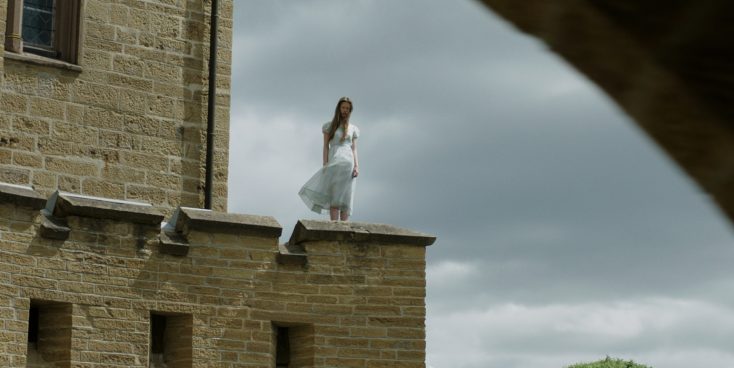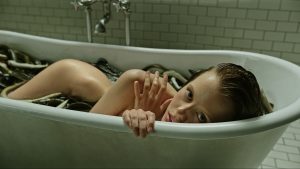By ANGELA DAWSON
Front Row Features
HOLLYWOOD—Actress/model Mia Goth, who may or may not be legally married to actor/political activist Shia LaBeouf, has developed a reputation in Hollywood as a daring actress. Her first role, at age 21, was in Lars Von Trier’s sexually charged “Nymphomaniac, Vol. II,” where she met and co-starred with LaBeouf.
The Southwark, London native also has appeared in a music video for American electronic band Future Unlimited, in which she played an abused wife who offs her husband, that was directed by LaBeouf. (She declines to publicly discuss their relationship although a video surfaced last fall of Goth and LaBeouf exchanging vows at a Las Vegas chapel.)
Goth stars in “A Cure for Wellness,” alongside Dane DeHaan (“The Amazing Spider-Man 2”) directed by “Pirates of the Caribbean” helmer Gore Verbinski, who co-wrote the thriller with Justin Haythe.
DeHaan plays a workaholic Wall Street executive who is ordered by his company to track down his boss who has gone AWOL after visiting a Swiss health spa. Completing that mission turns out to be more difficult than the rising young business executive expected. His boss is reluctant to leave the secluded facility and an injury forces him to check in as a patients at the remote mountaintop sanitarium. His treatment, administered by the institution’s overbearing and creepy Dr. Volmer (Jason Isaacs, Lucius Malfoy in the “Harry Potter” movies) makes him sicker, both physically and mentally, though. Goth plays Hannah, another spa guest—the youngest by several decades—whose presence mystifies Lockhart. She also is being “treated” by Volmer, who seems to have an unhealthy obsession with her. Lockhart begins secretly investigating Volmer and the historic spa’s dark secrets while trying to devise a way to escape with the beautiful and vulnerable Hannah.
The soft-spoken Goth discussed playing the mysterious and vulnerable Hannah, working alongside DeHaan and buying into the film’s thematic warning about how the pursuit for wellness actually may be harmful.
Q: How did you find out you got the part?
Goth: I got the call when I was in my car. I was sitting there at the DMV. So I was very grateful.
Q: What got your attention in the script about Hannah?
Goth: I was able to spot a lot of parallels between Hannah’s life and my own. Good things. It’s a real coming of age story. She’s forced to take that leap from girlhood to womanhood. When I filmed it I was 21, and that (transition) was something I connected to because stepping into that role of owning who you are as a woman can be quite overwhelming at times. There’s a lot of power with that. So I connected with that.
Also, I thought the script was very well written. I thought I knew where it was going and yet it never allowed you to predict what was going to happen. To get to work with Gore (Verbinski) in a genre that he helped define with “The Ring,” and Dane (DeHaan) already was attached to it, all of that made it something I really chased and wanted to be a part of.
Q: What did you tap into to play Hannah, who is so overprotected and naïve?
Goth: When I was talking to Gore about Hannah, one of the things he brought up is how a child looks at the world and how a child always asks why. It might leave an adult perplexed because you’ve never thought of that, and it’s actually a really valid question. That’s something I was able to use to help me better understand Hannah better. She has an interesting worldview of things. So it was trying to tap into all of that.
Q: How did you prepare mentally for playing this psychologically damaged character?
Goth: I never saw Hannah as being a prisoner or a victim. She has a very close relationship with Volmer (Isaacs). She’s the closest person to him. In many ways, they are each other’s hope. It’s just been told to her that she has to stay (at the health spa) for a certain amount of time and then things will move on. Because she has had a very sheltered and protected life, she’s never had to question people’s motivations or ideas of selfishness so I never saw her as being a prisoner.
Q: Since this films brings up big issues about how our society is so focused on trying to cure itself of some unknown sickness and how we’re working ourselves into early graves, have you thought about where you want to go with your career and balance it with what you want to do with your life? A lot of young actresses feel like they have to work continuously.
Goth: I’ve always thought that it’s really important as an actor that you have to live your life. To do a film and then go back to normal life and refill the happiness well, the sad well and the anxious well so then you’re able to go to work again and dip into what you have. I’ve found that if you just go from job to job to job, it’s possible that you could lose something. So I definitely think it’s important to live life and continuously try to understand who you are as a person because the more you know yourself, the better you can be at this craft.
Q: How was it working with co-star Dane DeHaan?
Goth: Amazing. I’ve been a fan of his work for a long time. I’ve always wanted to work with him. He’s a really good actor. He makes good choices. It was a really big deal for me to get to work with Dane and Gore.
Q: What was it like working with director Gore Verbinski on this bigger scale film?
Goth: I was expecting there to be quite a big difference because this is the biggest film I’ve ever worked on. This is tiny for Gore. We kept saying that on set. He kept saying, “It’s our little movie,” and I was like, “Oh.” I found it pretty much to be the same (as my previous films) because Gore was after similar things. When you get to these massive budget films, you start focusing much more on plot than people but Gore was very concerned and concentrated on character and the honesty of that, like any smaller movie.
Q: How creepy were the locations? One of them was Beelitz-Heilstatten, a military hospital outside of Berlin. Did you get a weird vibe there?
Goth: Some people said they felt ghosts. I didn’t. But it definitely had something off about it. It’s known to be the most haunted place in Germany. It’s where the Soviets used to send their dissidents so the doctors would try to fry their brains out. So when filming on location during the nighttime for weeks on end, there was something uncomfortable about that. It helped with the work.
Q: Were you there for the entire five-month shoot?
Goth: Yeah. The majority of it we shot in Berlin but we also did a month-long tour of Germany. We went to Hohenzollern Castle, which served as the exterior of the spa. That was really interesting too to see these different parts of Germany. It very much is its own character and has its own vibe.
Q: What was the mood like on the set?
Goth: It was pretty tense. And I like it like that. I do. The more you can create a reality of what’s happening off-set, then the less you have to do on-set. So I’m all for that. Jason Isaacs, who plays Volmer, has got a very lighthearted nature to him. That’s just the way he is. Gore would have to kind of pull him aside and say, “Don’t break the tension.” It was actually pretty tense, and I like it that way.
Q: Is it difficult to get into these very sexually driven roles? One of your first performances was in “Nymphomaniac, Vol. II,” and now you’re here in this, in which you appear in a very taboo scene with Jason. How do you mentally prepare for that? Are you nervous to do films like this?
Goth: Going back to “Nymphomaniac,” because that was the first thing I’d ever done, that was the first film set I had been in, I didn’t have anything to compare it to. And working with Lars (Von Trier), I felt completely safe and would have done anything for that. I was very grateful and just excited to be there. With “A Cure for Wellness,” it is a thought-provoking film. Everything from the title that sparks conversation, and you are meant to feel uncomfortable at times and uneasy. But I stand behind it because I know that every scene in the film is serving the story we’re telling and I only ever felt safe and empowered on Gore’s set.
Q: What does this movie do in terms of your perception of wellness? The movie raises the question: Are we as well as we think we are?
Goth: The subject matter it deals with is relevant and relatable. It’s asking some really uncomfortable questions that aren’t addressed in films much. People want to buy a special little pill to alleviate responsibility rather than take responsibility for their own state of mind and health. It’s asking questions like “Are you happy? Are you content with life? Is this relentless pursuit of power and wealth actually pointless?” I think it’s going to strike a chord with a lot of people because it’s very timely.
Q: What is your next film?
Goth: I’m working on a movie called “Suspiria.” We shot the majority of it in a place outside of Milan for four months, and now we’re going to go to Berlin in a couple of weeks to finish the filming of it. It’s been a ride.
Q: What’s the appeal of doing horror movies?
Goth: It’s not necessarily the genre that I’m going towards, or creepy movies. It’s the character, the director, the script and the cast. It just so happens that right now it’s these pretty creepy movies. It doesn’t mean I’m against doing anything else.
Q: Would you be up for doing a musical or comedy?
Goth: A comedy, yes. Musical? I don’t know. But never say never.






